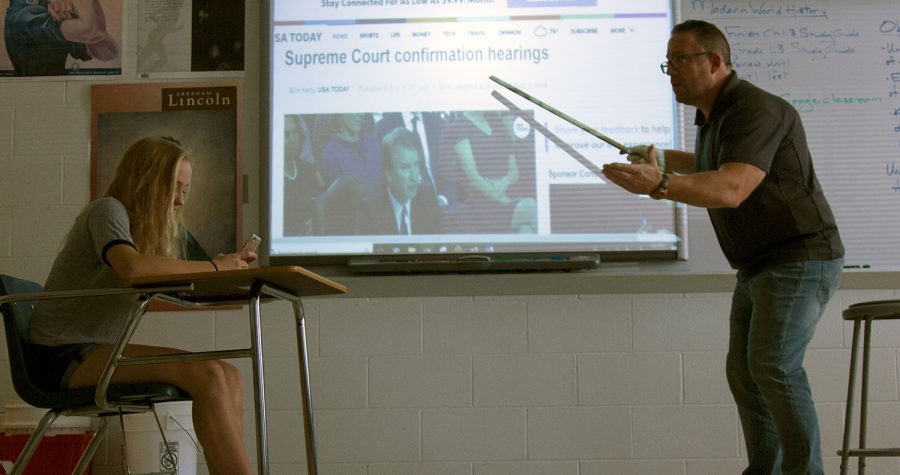Out of touch
Sarah Percy is ignoring Mr. Lober, who is trying to teach about current events. This disconnection detrimentally affects teenagers these days.
October 30, 2018
Sophomore Reed Easterling walks into school, heart heavy from the death of United States Senator John McCain. He looks for someone to talk about this tragedy. Everyone around him is talking about Netflix, memes, Fortnite, and YouTube, causing Easterling to feel very isolated. This sort of thing happens on a daily basis for the rare teenagers who are paying attention to current events. It creates a stigma around kids who know about recent news, where teenagers who know about current events are seen as “nerds” or “radical political activists”. Senior JD Salser is one of these teenagers who believe current events are important.
“It’s just important for the average American to understand what’s going on in our government,” Salser said.
Current events are such a distinguished part of society. People can connect to and learn what is going on around the world. Recent news make us aware of the situations in our lives. Current events are, in a sense, modern history at our fingertips. Teacher Donald Lober considers that teenagers aren’t connected to the news because of the overwhelming amount of options.
“Well, because there seems to be so many choices as to where one gets their news from. Meaning the sources of information are so varied these days. It’s hard to have an accepted version of what’s going on,” Lober said.
With the excessive amounts of news outlets, teenagers cannot decide which information is vetted or not. Many of the news channels or apps send out stories at such a fast pace, kids don’t have time to check the reliability.
“It’s about everything like everywhere and I guess that’s good, but it’s also like drinking from a water hose,” Lober said.
The amount of news has become an overflow, creating a rift in news knowledge. It would be a mental overload if everyone knew about everything, but it is important to know about the large events that go on in the world. It’s hard to weave through all of the information available at our fingertips to know what is most important or relevant at the time.
This current events disconnection is not a new trend. It has been happening since news first started.
“I think it’s been happening for all of human history. It’s just people who aren’t paying attention to what’s going on, and that’s been the case for forever,” said Easterling.
This current event detachment has become an epidemic. Many kids these days have little to no knowledge of current events. It’s spread is becoming more extensive each passing day. A multitude of teenagers around the world often find things such as politics trivial compared to social media.
“I think it has to do just with at least the new types of social medias when it comes to Snapchat, Instagram, Twitter, I mean, the list just goes on and on. But I think it’s kind of just summation of all these meaningless interactions, essentially. And so it kind of just numbs us to the whole social interaction thing,” Salser said.
The amount of new channels cannot compare to the extent of social media apps and websites. Social media has become the future of society, but in a negative way. These apps can help with learning about current news, but overall it distracts from reality. Apps such as Facebook and Twitter have a news sector, but it usually consists of unreliable news or unimportant stories about Tide Pods. But the overwhelming amount of other social medias have no news section at all. Considering this, many teenagers choose to ignore current events because of its lack of representation in social media.
Another significant reason that teens don’t want to learn about the news is because of the amount of tragedy and murder portrayed in it, according to Salser. Many news outlets report on a numerous amount of catastrophes and it desensitizes the average person from tragedy.
“It’s just like you kinda don’t know how to react to it anymore to a certain extent,” Salser said. “Just because it loses its meaning every single time.”
Tragedies in the world have become over-reported to the point where many kids become numb to homicides, mass shootings, racial divide, and politics. Considering the excessive disaster in the news, many teens avoid it all together. Though avoiding tragedies can be beneficial, avoidance of all types can have detrimental effects. If people refrained from learning about September eleventh or the Sandy Hook shooting, society could be a very different place.
Though current events have their flaws, it’s still important to learn about them. Without it, people would be left in a world of blankness and mass ignorance. Current events are modern history at our fingertips. With no history, people will inevitably repeat their mistakes and be unable to move forward with innovations. This separation from the news is affecting people on a global scale.
“It’s affecting us because we still live in a world of where we’re still affected by decisions. We have to be connected to the current events so that we can realize what’s happening,” Easterling said.
There is no real clear way to fix this disconnection but there are a few suggestions that could get teenagers started. One way is to download a new app such as the Fox2 News or CNN news app on your phone. Another way to become more aware of current events is to take the current events class offered at our school.
“The first step that I took was I took AP Government with Beckmann and then he kind of prompted me to take this current events class which is really just helping me be more aware,” Salser said.



